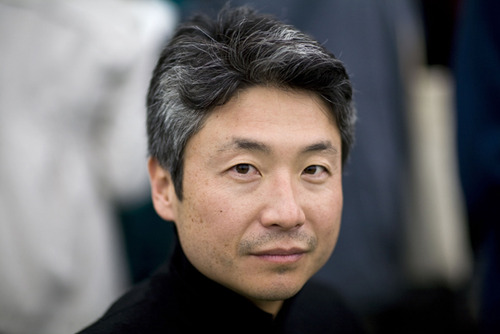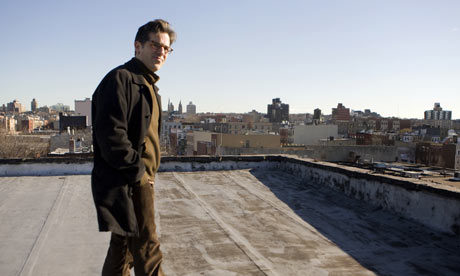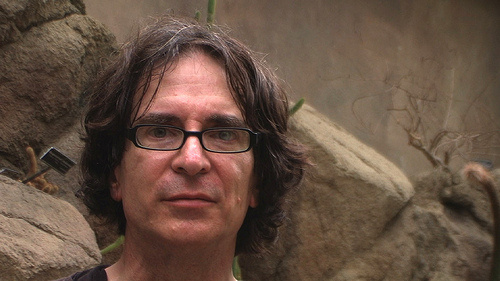
A Survey of Writers on Contemporary Writers
Listening to writers read and discuss their work at Newtonville Books, the bookstore my wife and I own outside Boston, I began to wonder which living, contemporary writers held the most influence over their work. This survey is not meant to be comprehensive, but is the result of my posing the question to as many writers as I could ask.
JHUMPA LAHIRI

© Dan Callister
ALETHEA BLACK: When I first read Jhumpa Lahiri’s work, I’d been writing for eight years, and was still about eight years away from publishing my first book. Her elegant prose,and what it taught me about precision, power, and restraint, was a turningpoint, and is still a touchstone I return to. What I love most is the way sheis simultaneously insightful and entertaining, fluid and masterful. Her workmakes me feel as if I’ve dropped down into the hidden undercurrent of truelife, and never fails to remind me of why I became a writer in the first place.
KAREN THOMPSON WALKER: As a graduate student, I studiedJhumpa Lahiri’s stories the way someone else might study a car’s engine, bydismantling them and studying the parts. Gradually, I got better at sensing thearchitecture of those elegant stories, the way the later sections rise directly
but imperceptibly from the earlier events. I probably learned more about
storytelling from her story “A Temporary Matter,” the ending of which is simultaneously surprising and inevitable, a
subtle sleight of hand, than any
other single work I’ve ever read.
CHANG-RAE LEE

© David Levenson
RACHEL DEWOSKIN: The last
lines of Chang-rae Lee’s A Gesture Life
read, “I will circle round and arrive again. Come almost home.” The first time
I landed on “Come almost home,” I flipped straight back to the beginning and
read the book again. Slowly the second time, because I had blazed through it so
fast the first. I subsequently read every one of his books, ravenously once and
then carefully again, circling back. His novels have changed my writing, teaching,
and thinking. My own books are about people on the periphery, and no one writes
outsiders’ stories quite like Chang-rae Lee. His protagonists have still
surfaces; they are constructed as finely as phrases of detached, perfect
diction. And yet underneath their cleanly assimilated, English-language
exteriors are histories of turmoil powerful enough to drive whole (often epic)
novels. Theirs are stories of love in the time of comfort women, of war, and of
perpetual circling, trying to find some balance between interior and exterior
lives. History alternately creeps up slowly and accelerates, slamming into the
present tense.
I always
assign Chang-rae Lee’s novels to my undergraduate and graduate students, not
just because I want to read them again and again myself, not just because
they’re structurally brilliant, but also and always because they are full of
empathy and grace. All of his
protagonists get loving, calm, three-dimensional treatment, even in instances of
criminal behavior, even when the plots reach frenzied pitches. Lee harnesses
the repressed energies of his characters into stories so suspenseful that they
are themselves at odds with his quiet style.
How can we all be as simultaneously restrained and full-throttle,
telescopic and giant in our scope?
RU FREEMAN: I admire
Chang-rae Lee’s meticulously written prose which somehow manages to bridge the
inherent self-consciousness of craft with the utter abandon of story-telling.
IRINA REYN: It is no
exaggeration to say that Chang-rae Lee’s Native Speaker convinced me
that becoming a writer was a worthy enterprise for an immigrant after all. It
was published a year after I graduated from college, at a time I was drifting
from job to job while struggling to cobble together a narrative around my
immigration from the former Soviet Union. Everything I wrote felt too simple,
organized into neat dichotomies of “here” and “there”. From the very first
line—“The day my wife left she gave me a list of who I was”—Native Speaker
was a revelation. I still remember that “false speaker of language” was one of
the items on that damning list. Yes, I thought. At last. The way duality of
language and culture fragments a psyche. The way we are forced to shuffle
identities depending on the company we keep. This was no common tale of
rosy-cheeked, striving, assimilating immigrants, not merely a story of
isolation and alienation that we might expect, but something narrator Henry
Park calls his “American education”: “My ugly immigrant’s truth… is that I have
exploited my own, and those others who can be exploited.” Immigrants as
exploiters. Now this was something new.
JONATHAN LETHEM

© Matthew Salacuse
IVY POCHODA: I grew
up in Cobble Hill, Brooklyn back when you were lucky to convince a taxi driver
to cross the bridge, when it was necessary to justify my parents’ preference
for our borough over Manhattan, when it wasn’t somewhere “cool” but some place
special. My friends and I would play unsupervised in the street, on the
sidewalks, in the alley next to my house. We played city-kid games: stoopball,
running bases, four square. We had block long water fights and tried our luck
with skateboards on a homemade quarter-pipe. We knew our neighbors, rang their
doorbells, stopped by unannounced.
Whenever
I left home, for summer camp and later for college, I never tired of trying to
explain Brooklyn to the uninitiated. My borough is and was important to me in
ways I struggled to articulate, ways I didn’t understand. It was tough and
beautiful, hopeful and desperate.
I moved
abroad after college, looking for my own “Brooklyn,” somewhere I could
discover, or rather rediscover, like my parents had Cobble Hill. And in my
absence, my old neighborhood changed. Streets that I was forbidden from walking
down when I was a kid became home to Michelin-star restaurants. Italian social
clubs turned into private yoga studios. My neighborhood, my Brooklyn, began to
slip away, and I grew worried that I’d lost it forever.
I read
Jonathan Lethem’s The Fortress of
Solitude when I was living in Amsterdam. From the first page, I knew I’d
come home. (Lethem’s book is set five blocks from my parents’ house.) It was
all there both physically and emotionally: the delicious freedom of being
allowed to play on the street after dinner, the old men sitting on milk crates,
rolling empties of Manhattan Special, the inner city wonder of an ailanthus
pushing through the sidewalk, the remarkable childlike perspective of an entire
world narrowed to a single city block. Lethem brilliantly recovered a time and
a place I feared lost to gentrifying invaders, to people who love Brooklyn but
for entirely different reasons that I did and do. The Fortress of Solitude captures the entire panorama of my
childhood, from the precise the slang of my corner of Brooklyn, the class
anxieties of growing up in a neighborhood on the verge, to the pride I derived
from my own outer-boroughness.
Of course there are no shortage of books set in Brooklyn,
Lethem’s own Motherless Brooklyn for
instance. But unlike other books set in the borough, The Fortress of Solitude unashamedly mixes poetry and street slang.
It’s tough without being hardboiled. It’s magical and musical. It’s a novel of
contradictions, both wholly realistic, yet imbued with a daring dose of magical
realism that recalls the most powerful childhood imaginings. In other words,
it’s a perfect reflection of the Brooklyn itself. My Brooklyn.
I was struggling to write my first novel when I read The Fortress of Solitude. I thought
books had to be wildly imagined, fantastically conceived, take you places you’d
never been, force your mind into different worlds. I didn’t know that the best
stories could be found so close to home, that my own block might hold enough
magic and wonder, poetry and pain.
MATTHEW SPECKTOR: Jonathan
Lethem embarrassed me. I came to Lethem’s work late—this isn’t the embarrassing
part—but after Motherless Brooklyn,
and after the half-decade or so of work that preceded it, I picked up Fortress of Solitude. A little
reluctantly. I’d nibbled the edges of earlier books without being fully
persuaded (without giving them the sort of attention that would’ve allowed them
to persuade), and so it took a wolf in so-called realist’s clothing to do it.
Unlike its predecessors, unlike even Motherless
Brooklyn, which was too alert in fucking around with gumshoe tropes to
qualify, Fortress was a social novel.
An evident social novel, anyway: by the time we got to any reality-bending
elements, I was too deeply immersed in the Boerum Hill of the 70s to care. The
thing was, I was touched by it. It
wasn’t ambition, or scope, or scale, or ideas—I could feel the press of DeLillo
all over it, his muddy thumbprints smudging the sentences, but I didn’t care
about that, either—it was depth. And
a very specific kind of depth, at that. His characters were not merely haunted,
or round: they were humiliated, in a way that felt nearly metaphysical. They
were not mocked, but rather, butterflied. For all the yokings and beatdowns,
the street-level subjugations endured by Dylan—and Lethem seemed to need to
invent an even greater nerd, just to contain the overflow, in the indelible
Arthur Lomb—the book seemed to contain neither a hunger for punishment nor one
for revenge. Fortress isn’t a
sadistic book, nor a masochistic one, but it is almost infinitely humane.
To that point, I suppose, I’d been under the spell of
writers who were more or less mandarin: a James Salter here, a Shirley Hazzard
there, writers whose sentences attained to a perfect equipoise. Lethem was
deliberately lumpy (Ebdus joined a parade of protagonists whose names lodge
like a bone in the throat: Lionel Esrog on one side, Perkus Tooth on the
other), fine-tuned in his perceptions, calmly musical perhaps but never fussy.
Yet the more important thing was this openness to embarrassment. The moment I
saw it enacted as drama, I began to notice, too, the presence of humiliation as
theme, as leitmotif, as organizing principle even. (How often the word ‘shame’
appears in middle-period Lethem, as well. Search The Disappointment Artist and see how often. Even when he’s writing
warmly and lauditorily about Philip K. Dick, one of his heroes, Lethem returns
again and again to Dick’s alleged worst novel, Vulcan’s Hammer, calling it out for “special shaming.”) What is
Lionel Esrog’s Tourette’s syndrome but an engine for such, the relentlessness
of the private, inappropriate self busting out in public? Lethem’s
predecessors—Saul Bellow, say, in Seize
The Day—give us the agonizing feel of the effort to maintain appearances in
the face of private collapse. Motherless
Brooklyn simply dispenses with the effort. The self can’t help but irrupt,
in all its red-faced glory.
This is the American Grain, of course. Whether our
secrets must be declared (Whitman) or suppressed (Henry James), our literature
exists to shine a light on them, and Lethem’s casual disarming of his own defenses—the
way he seemed to pick the lock on a generational self-consciousness—helped me
put paid to my own. It did what writers have always done for each other, what
Hawthorne did for Melville, for example. It liberated me, it woke me up, and it
freed me to maximize my talents, to embrace—rather than dodge—my literary
limitations.
CHARLES YU: Jonathan
Lethem is unclassifiable. I don’t think he is constrained by anything,
stylistically, thematically, formally. Many novelists of his caliber are, like
him, in a category of one, but what Lethem does that makes him so important, I
think, is that he imagines new completely new areas in literary possibility
space, and then fills the possibility with an actuality, and does it in a way
that acts as a bridge for other novelists to cross into the space.
GARY LUTZ

© John Madera
RYAN BOUDINOT: I’ve
noticed that Gary Lutz’s lecture that he delivered at (I think) Columbia,
“The Sentence is a Lonely Place,” is frequently passed around by
writing grad students who are drawn to language-driven prose. It’s kind of
ridiculous to even use the term “language-driven” because isn’t all
prose driven by language? Regardless, Lutz, to my mind, is the best example of
the acolytes of Lish, the writers whose work makes you stop and savor individual
lines. He pushes his language into the realm of poetry and some of his stories
barely hold together, plotwise. And as far as subject matter, he’s pretty
uni-dimensional—his stories convey the same weary, alienated mood most of the
time. But I want to underline every one of his sentences. He’s like a guitarist
who can play three notes and you know who’s playing them immediately. A Gary
Lutz sentence is like no other. There’s a whole domain of the English language
that seems to belong only to him.
NELLY REIFLER: Reading
Gary Lutz’s Stories in the Worst Way was like catching a virus. For
several years I couldn’t get his weird precision and gymnastics with parts of
speech out of my brain. I’d spend ages on each sentence that I wrote. Writing
was a difficult; I felt contorted, twisted up in knots. It made me a better
writer.
WHITNEY TERRELL: There
are writers I read and admire even though their work is very different from my
own. For instance, contemporary experimental writers like Gary Lutz. My interest
in him quickened after my exposure to the war in Iraq, where I worked as an embedded
reporter. The war was, to put it mildly, a surreal experience. When I looked
back at past war literature, I found that writers like Blaise Cendrars and
Celine had managed to bring that feeling to the page by defying and distorting
the normal confines of realism. That led me to contemporary writers who did the
same thing. I don’t know if I can define how Lutz and other writers like him
(Aimee Bender, George Saunders, Adam Johnson) influence my work yet, except to
say that they continually remind me that my way of doing things isn’t the only
option.
–
Alethea Black is the
author of the short story collection I
Knew You’d Be Lovely
Karen Thompson Walker is
the author of the novel The Age of
Miracles
Rachel DeWoskin is the
author of the novels Blind and Big Girl Small
Ru Freeman is the author
of the novels On Sal Mal Lane and A Disobedient Girl
Irina Reyn is the author
of the novel What Happened to Anna K
Ivy Pochoda is the author
of the novels Visitation Street and The Art of Disappearing
Matthew Specktor is the
author of the novels American Dream
Machine and That Summertime Sound
Charles Yu is the author of the novel How to Live Safely in a Science Fictional Universe and the short story collections Third Class Superhero and Sorry Please Thank You
Ryan Boudinot is the author of Blueprints of the Afterlife, Misconception, and The Littlest Hitler: Stories
Nelly Reifler is the
author of the novel Elect H. Mouse State
Judge and the short story collection See
Through
Whitney Terrell is the
author of The King of Kings County and The Huntsman
Lettering by Caleb Misclevitz
–




